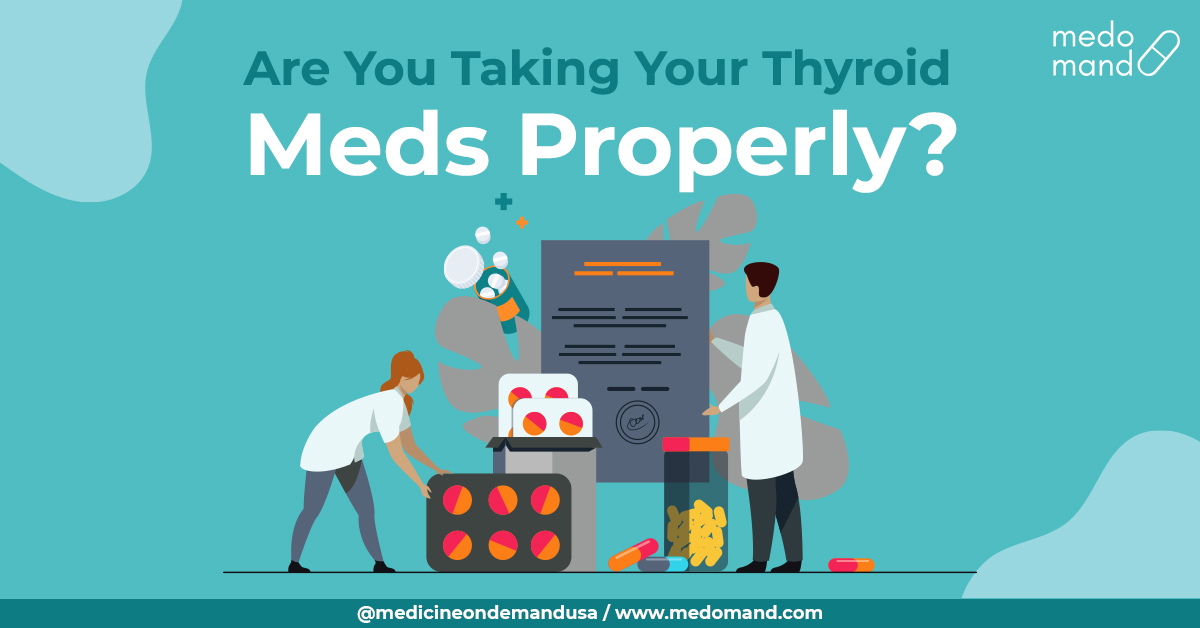Your thyroid plays a vital role in your various body systems. This little butterfly-shaped gland located in the base of the neck has a huge responsibility for your well-being and health. It has an important role in affecting the important organs of your body, such as the liver, kidneys, brain, heart, and skin. Thus, ensuring that your thyroid gland is functioning healthily is crucial for your wellness.
What Does The Thyroid Do?
Your thyroid releases and manages hormones that control metabolism. The process where the food that you consume is transformed into energy is known referred. The energy is used by your body to help perform its functions properly.
The thyroid controls your body’s metabolism with a few particular hormones, including T3 or triiodothyronine that contains three iodide atoms, and T4 or thyroxine that contains four iodide atoms. The thyroid gland produces both these hormones, and they guide the cells of the body on how much energy to use. When your thyroid is functioning properly, it will maintain the right amount of hormones keeping your metabolism at the right rate.
The functioning of the thyroid is supervised by another gland located in the center of the skull below your brain, the pituitary gland. This gland controls and maintains the normal level of thyroid hormones in the bloodstream. When there is fluctuation in the thyroid hormones level like as they increase or decrease, the pituitary gland senses it and adjusts with its hormone, thyroid-stimulating hormone or TSH. The thyroid-stimulating hormone is sent to the thyroid and tells what needs to be done to restore the hormones to the optimum level.
Thyroid Disease
The general term used for the condition in which the thyroid doesn’t produce the right amount of hormones is thyroid disease.
When the thyroid produces an excess of hormones, your body starts to use the energy at a high rate. This condition is known as hyperthyroidism. Using energy too fast will make you more tired and increase your heartbeat, causing weight loss without even trying. It even makes you feel nervous. Hyperthyroidism can lead to stroke, heart problems, vision loss, and osteoporosis.
On the contrary, when the thyroid doesn’t produce enough hormones, the condition is called hypothyroidism. It also makes you tired but causes weight gain. Also, you may be unable to bear cold temperatures. Hypothyroidism can lead to depression, infertility, heart problems, and obesity, among others.
Causes of Thyroid Disease
Thyroid disease can affect anyone- women, men, the elderly, teenagers, and infants. It can develop as you age, especially after menopause in women, and can also be present by births (usually hypothyroidism). However, a woman is more likely to be diagnosed with thyroid disease than a man.
Besides, you may be at a higher risk of getting a thyroid disease if you have the following:
- A medical condition such as rheumatoid arthritis, type 1 diabetes, pernicious anemia, lupus, Turner syndrome, or primary adrenal insufficiency
- Family history of thyroid disease
- Consuming medicines with high iodine content
- Have you had any thyroid condition in the past, like radiation or thyroidectomy
Furthermore, both the conditions of hypothyroidism and hyperthyroidism can be caused by other diseases impacting the normal functioning of the thyroid gland.
Conditions that cause hyperthyroidism include:
- Excessive Iodine: When you have excess iodine in your body, the thyroid gland produces more hormones than it requires. Too much iodine can be found in cough syrups and some medications like amiodarone.
- Thyroiditis: In this disorder, the thyroid releases hormones that are stored there. You can either not feel anything at all, or it can be too painful.
- Nodules: Those that are overactive within the gland can cause hyperthyroidism. Gland with numerous nodules is referred to as toxic multi-nodular goiter, and a single toxic nodule is known as a toxic autonomously functioning thyroid nodule.
- Graves’ Disease: This disorder can result in an overactive thyroid gland producing too much hormone. It is also called enlarged thyroid gland or diffuse toxic goiter.
Conditions that cause hypothyroidism include:
- Iodine Deficiency: As you know, iodine is required in the production of hormones by the thyroid. So its deficiency will affect the normal hormone creation.
- Thyroiditis: It involves swelling or inflammation of the thyroid gland and can result in the production of lower amounts of hormones.
- Hashimoto’s Thyroiditis: It’s an autoimmune condition where the body cells attack and destroy the thyroid gland. This condition is hereditary.
- Non-Functioning Thyroid Gland: This condition occurs in infants where the thyroid doesn’t work properly since birth. If not treated immediately, the child could suffer from mental and physical issues in the future.
Diabetes Can Put You at Higher Risk of Developing Thyroid Disease
If you have diabetes, then you are more prone to develop thyroid conditions than non-diabetic people. Type 1 diabetes is an autoimmune disease. So if you are suffering from one autoimmune disease, you are at high risk of getting another.
On the other hand, people with type 2 diabetes are at lower risk. However, it is still there. You may develop a thyroid condition in your later life.
You are recommended to get your thyroid regularly tested if you have diabetes.
Symptoms of Thyroid Disease
You can experience various symptoms if you have thyroid disease. But the symptoms are quite familiar with other medical conditions.
Symptoms of hyperthyroidism (overactive thyroid) include, but are not limited to:
- Weight loss
- Trouble sleeping/ insomnia
- Irritability, nervousness, and anxiety
- Goiter or enlarged thyroid gland
- More sensitive to heat
- Eye irritation or vision issues
- Irregular menstrual cycle
- Tremors and muscle weakness
Symptoms of hypothyroidism (underactive thyroid) include, but are not limited to:
- Weight gain
- Fatigue
- Coarse and dry hair
- Heavy and frequent menstrual periods
- Forgetfulness
- Intolerance to cold temperatures
- Hoarse voice
Thyroid Disease Treatment
Your doctor aims to get your thyroid hormone level back to normal. It can be done in various ways, and the treatment depends on the cause of the thyroid disease.
Treatment options for hyperthyroidism include:
- Radioactive Iodine: It involves damaging the cells of thyroid glands, preventing them from making excess levels of hormones.
- Anti-Thyroid Drugs: Your doctor can prescribe you medicines that stop producing thyroid hormones, such as propylthiouracil and methimazole.
- Surgery: It is a more permanent treatment. Your doctor can surgically remove your thyroid gland, known as a thyroidectomy. With this, you will require to take thyroid replacement hormones for your entire life.
- Beta-Blockers: Such kind of medicines helps to control your symptoms rather than changing the amount of thyroid hormones in your body.
For hypothyroidism
The treatment for hypothyroidism is thyroid replacement medication. It involves adding synthetic thyroid hormones into your body. You can control thyroid disease with this medication and live a normal life. A commonly used drug is levothyroxine.
Bottom Line
Often thyroid is a life-long medical condition that requires constant monitoring and managing, requiring daily medication. Your doctor or healthcare provider can make adjustments to your treatment from time to time. You can live a normal and happy life with a thyroid disease once you find your right line of treatment.
You can find all thyroid medications on Medomand. Just upload the prescription and get your meds delivered to your doorstep.
Disclaimer: The information contained in this article is for educational and informational purposes only and should not be relied upon for any diagnostic or medical purpose or the treatment of any symptom or condition.

